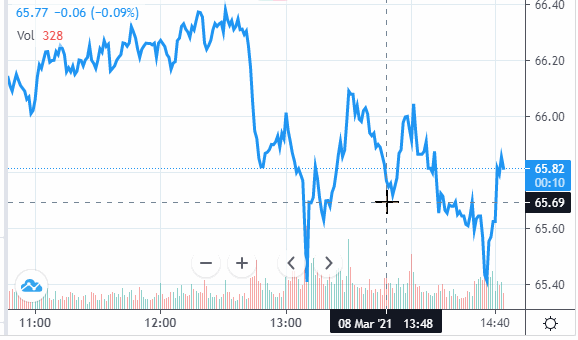Having buoyed by the absence of an immediate threat
from the US shale producers, Saudi Arabia shows no sign of slowing down its
ambition to cash in on its position being the world’s top crude oil exporter.
It raised the oil price for Asia and the US for the
second time in a matter of few months; it still maintains the unilateral
production cut of 1 million bpd, in addition to what was agreed upon at the
recent OPEC+ meeting.
The rise in oil price had already affected the Asian
consumers when they are pursuing the economic recovery with renewed vigour.
That’s why India, the world’s third biggest oil consumer, made its displeasure known
about what it called, ‘artificial production cuts’ in order to boost the price.
Judging by the rise in oil price in the wake of
criticism, Saudi Arabia showed its consumers in Asia that business comes first
over regional loyalties.
Saudi decision to increase the price will certainly resonate
with some members of the OPEC+ in the Middle East; both Iraq and the UAE may
follow suit soon.
Saudi Arabia, meanwhile, is constantly under attack
by Houthi rebels from Yemen; the latest was the explosive-laden drone fired
from the sea at one of the most protected oil facilities in Saudi Arabia.
Although most of the missiles fired by the Houthis
are intercepted, the risk of damage has not been fully eliminated;
counter-attacks, mainly from the air, by the Saudi-led coalition have just been
carried out on impulse rather than something that stems from a consistent
strategy.
Houthi rebels were designated as a terrorist outfit
by the Trump administration during the last few days in office; it was reversed
by the Biden administration on condition that Houthis would not attack Saudi
Arabia.
The attacks by the Houthis have since escalated and the
Saudi-UAE coalition blames it squarely on those who reversed the decision of
listing as the terror outfit.
The Saudi-led coalition has very little room for manoeuvre,
though: both Saudi Arabia and the UAE are under US arms embargo at present; the
Houthi missiles are intercepted by the American weapons and without them Saudi
Arabia will be in deep trouble.
Moreover, regular attacks by the Houthis have not
affected the oil price badly as the initial shocks die out fast, because the
markets know Saudis still can defend themselves while minimizing the damage
thanks to American support to stand on its feet.
Despite all that Saudi Arabia has raised the oil
price for the US as well. Although Mr Biden is keen on embracing renewables,
the oil price hike, coupled with production cuts, at a difficult time may not
go down well with the administration and the US consumers.
Mr Biden will be sandwiched between his commitment
to green energy and the realities on the ground due to rising price of crude
oil. In this context, banning fracking on Federal lands will come under an
intense spotlight when the US consumers really feel the pinch.







